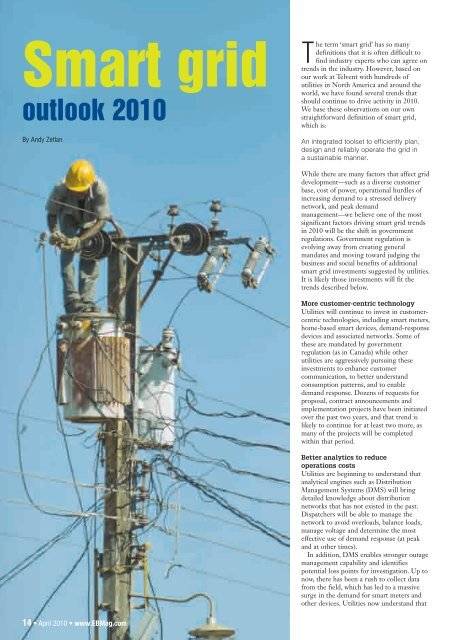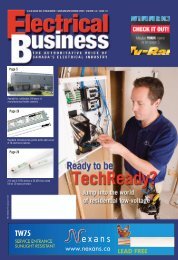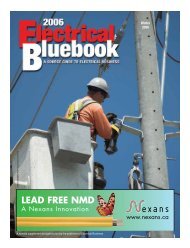Smart gridoutlook 2010By Andy ZetlanThe term ‘smart grid’ has so manydefinitions that it is often difficult tofind industry experts who can agree ontrends in the industry. However, based onour work at Telvent with hundreds ofutilities in North America and around theworld, we have found several trends thatshould continue to drive activity in 2010.We base these observations on our ownstraightforward definition of smart grid,which is:An integrated toolset to efficiently plan,design and reliably operate the grid ina sustainable manner.While there are many factors that affect griddevelopment—such as a diverse customerbase, cost of power, operational hurdles ofincreasing demand to a stressed deliverynetwork, and peak demandmanagement—we believe one of the mostsignificant factors driving smart grid trendsin 2010 will be the shift in governmentregulations. Government regulation isevolving away from creating generalmandates and moving toward judging thebusiness and social benefits of additionalsmart grid investments suggested by utilities.It is likely those investments will fit thetrends described below.More customer-centric technologyUtilities will continue to invest in customercentrictechnologies, including smart meters,home-based smart devices, demand-responsedevices and associated networks. Some ofthese are mandated by governmentregulation (as in Canada) while otherutilities are aggressively pursuing theseinvestments to enhance customercommunication, to better understandconsumption patterns, and to enabledemand response. Dozens of requests forproposal, contract announcements andimplementation projects have been initiatedover the past two years, and that trend islikely to continue for at least two more, asmany of the projects will be completedwithin that period.Better analytics to reduceoperations costsUtilities are beginning to understand thatanalytical engines such as DistributionManagement Systems (DMS) will bringdetailed knowledge about distributionnetworks that has not existed in the past.Dispatchers will be able to manage thenetwork to avoid overloads, balance loads,manage voltage and determine the mosteffective use of demand response (at peakand at other times).In addition, DMS enables stronger outagemanagement capability and identifiespotential loss points for investigation. Up tonow, there has been a rush to collect datafrom the field, which has led to a massivesurge in the demand for smart meters andother devices. Utilities now understand that14 • April 2010 • www.EBMag.com
a better approach is to installmeasurement devices inconjunction with analytic software;they not only measure but provideintelligence regarding theoperation of the network in realtimeand into the future.The recent use of DMSsoftware at Progress Energy andthe University of Michigan in theUnited States (and at severalutilities worldwide) demonstratesthis trend.Data managementand securityThe smart grid brings with it agreat deal of additional data tomanage, plus many additionalattributes and data types. Newassets like smart meters and smartswitches will be added, andinformation must be maintainedabout those devices. Data will becollected from those assets morefrequently than they are today, andwill raise challenges for managingthe data for many uses.Utilities will start to deal moreaggressively with the reduction ofthe number of databases to ensurethe integrity of the data that ismaintained, including automatingwork processes that update assetinformation. Also, governmentregulation and common businesspractice will force a dramatic risein the attention given to security ofboth the data and of the devicesthat collect it.Utilities will focus smart gridefforts on business benefitUntil now, the priorities for thesmart grid were often set by governmentregulators. Once these initialinvestments are completed, however,utilities will continue with incrementalinvestments that providestrong business benefit. For someutilities, the investment will result incost savings, such as the cancellationof power plant construction or ofcircuit reconstruction to handleincreasing demand (for example, theinflux of electric vehicles and theircharging stations).For other utilities, increased reliability,reducing outages andinterruptions, and managing voltagecarefully to improve quality of servicewill be the objective. And, forothers, success will be defined bystronger customer interaction, whichwill provide both new revenue andconservation opportunities, andchange the demand patterns toenable growth of consumption withoutsignificant investment.In all instances, these changeswill provide the ultimate benefit of addedsustainability to our already fragileenvironment.New technology to monitordistribution networkUtilities will add technologies to moreclosely monitor the distribution network toenhance its management and integrity.Coupled with DMS analytical functionality,SCADA systems will grow through additionalRemote Terminal Unit (RTU)deployments to provide a more comprehensiveview of the power deliverynetwork.Because voltage management willrequire RTUs to employ more precisesensors, the industry is responding withthe development of smart RTUs; theaddition of motorized switches inconjunction with those RTU deploymentswill enable the level of ‘self-healing’ thatimproves the integrity of the powerdelivery network.Of course, utilities will have to deal withthe challenges that these smart gridadvancements will bring. For example,traditional ‘silo’ functions in utilities willneed to integrate more effectively.Customer service, system operations,engineering, maintenance and otherfunctions will be collaborating on smartgrid issues in a manner that is differentthan traditional work practices of the past,and may, as a result, be one of the moredifficult goals to achieve.Utilities will simply have to organizethemselves around important businessprocesses (new service design andInterop_EB_April10.indd 1<strong>Business</strong> benefit,data, analytics andcustomer-centrictechnologies aheaddeployment, outage management) whileretaining traditional organizations tocultivate and grow important skill sets.Intense growth aheadThe smart grid era is driving significantchanges to utilities and their customers,and these trends provide a level ofunderstanding of where we are today andwhat to expect in 2010—and beyond. Thenext few years should be, as a result, aperiod of intense growth and change in anotherwise unchanging industry.Andy Zetlan has more than 35 years of utilityindustry experience and an advancedknowledge of smart grid technology. As aTelvent smart grid industry expert, he is afrequent speaker at industry conferences andhas served as a professor of GIS technology atthe University of Delaware. You can reach himat azetlan@telvent.com. For moreinformation, visit www.telvent.com.3/3/10 3:34:16 PMwww.EBMag.com • April 2010 • 15

















